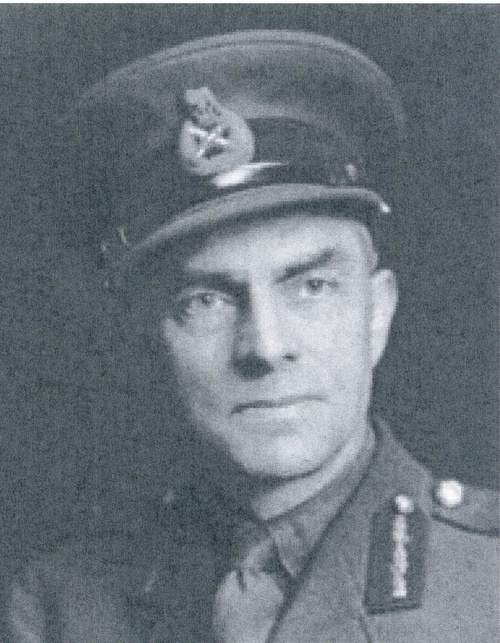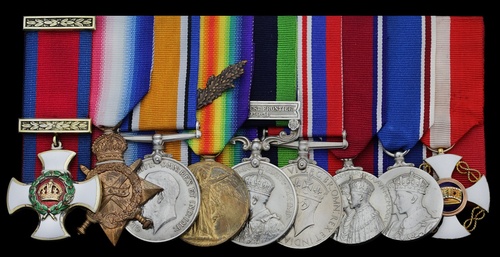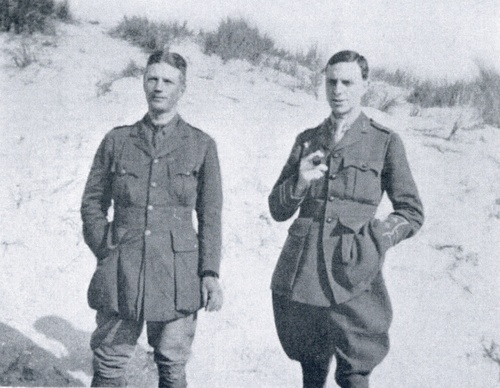Auction: 20001 - Orders, Decorations and Medals - conducted behind closed doors
Lot: 707
The historically important D.S.O. group of nine awarded to Major-General P. de Fonblanque, Royal Engineers, who served as Head of the British Mission to Czechoslovakia at the time of the Munich Agreement and later successfully organised the logistics for the British Expeditionary Forcce evacuation from France, being personally acknowledged Winston Churchill
Distinguished Service Order, G.V.R., silver-gilt and enamel, with top riband bar; 1914-15 Star (Capt. P. De Fonblanque. R.E.); British War and Victory Medals, with M.I.D. oak leaves (Major P. De Fonblanque.); India General Service 1908-35, 1 clasp, North West Frontier 1930-31 (Lt. Col. P. De Fonblanque. R.E.); War Medal 1939-45; Jubilee 1935; Coronation 1937; Italy, Kingdom, Order of the Crown, Knight's breast Badge, gold and enamel, good very fine (9)
D.S.O. London Gazette 1 January 1918.
Italy, Kingdom, Order of the Crown London Gazette 12 September 1918.
Philip de Fonblanque was born on 16 November 1885 at Maharashtra, India, the elder son of Lester Ramsay de Fonblanque, Vicomte de Fonblanque, whose father was Edward Barrington de Fonblanque, a writer and traveller descended from a prominent French Huguenot family, and Constance Lucy, the daughter of Colonel The Honourable Robert Dundas Kerr, and great-granddaughter of William Kerr, 5th Marquess of Lothian. Educated at Rugby School from May 1889, Philip spent his school holidays at the family home in Eastbourne before becoming a Cadet at the Royal Military Academy, Woolwich, from 1902-03. Here he would have learned about British military history, not least from the works of his grandfather Edward Barrington de Fonblanque who was famous at that time for his publication Political and Military Episodes in the Latter Half of the Eighteenth Century.
Granted a commission to the Royal Engineers in March 1905 (Truth, refers), de Fonblanque was promoted Lieutenant in 1907 and Captain in 1914, before serving in France from 18 July 1915. Returning home on leave, he married Stella May, the eldest daughter of Sir Henry May, K.C.M.G., Governor of Hong Kong, at the Brompton Oratory on 27 March 1916. According to The Globe newspaper:
'The ceremony took place at forty-eight hours' notice, as the bridegroom (who is in the Royal Engineers), was only able to get short leave from the front. As Sir Henry and Lady May are at present in Hong Kong, the bride was given away by her uncle, Colonel Acton, and Lady May's sister.'
Aside from the vast distance between Hong Kong and London which accounted for the bride's parents being absent, Sir Henry May was also known to be a reluctant traveller having been the target of an assassination attempt on 4 July 1912, the only Hong Kong Governor in history to face such treatment (An International History of Terrorism: Western and non-Western experiences, refers). He was uninjured by the 25 year old assassin, Li Hung Hung, but the bullet lodged in the sedan of his wife and likely gave her a nasty shock.
Appointed Temporary Major, de Fonblanque took command of a Field Company of the Royal Engineers in November 1916 and became a Staff Officer in July 1917, being decorated with the D.S.O. and twice mentioned in despatches during the Great War (London Gazette 18 May 1917 & 11 December 1917, refer). He continued to hold a series of Staff posts during the inter-war years, culminating in his appointment as Chief Administrative Officer of Scottish Command in 1937 and promotion to Brigadier. He was a passionate supporter of the mobile Army Information Bureau, which spent the summer of 1938 covering 3000 miles between Thurso and Stranraer acting as a form of 'travelling sales' for the British Army (The Scotsman, 11 June 1938, refers). However, in October 1938, just four months later, his somewhat idyllic tours of Scotland were cut short when he headed the British Mission to Czechoslovakia with the task of observing the withdrawal of the Czechoslovak Army from the Sudentenland as per the terms of the Munich Agreement. The circumstances are described by authors Peter Wilkinson and Joan Bright Astley in their much heralded work Gubbins & SOE:
'The Mission, headed by Brigadier P. de Fonblanque, left Croydon for Berlin on 3 October 1938. Gubbins found the whole business distasteful. He disapproved of the Munich Agreement and admired the Czechs, later describing them as "a thoroughly decent democratic little nation" and their Sudeten Germans as better treated than any other minority in Europe. However, it was certainly an eye-opener for him to witness at first hand the brutal force of Nazi expansion.'
Returning to London not long thereafter, de Fonblanque witnessed at first hand Hitler's vacillations and the unremitting efforts of the Chamberlain Government to come to terms with the dictator. It is very likely that alongside Major-General Sir Colin Gubbins, K.C.M.G., D.S.O., M.C., he felt a sense of shame that apart from establishing an agreed demarcation line, the Mission did nothing to stop the Czechs becoming victims of the Nazi coup de force. As Chamberlain declared 'Peace for our time' to cheering crowds on 1 October 1938, de Fonblanque and his team looked to a future of increasing German militarism. In his address to the House of Commons on 5 October 1938, after the Munich agreement began the dismemberment of Czechoslovakia, Winston Churchill did not mince his words:
'I will begin by saying what everyone would like to ignore or forget but which must nevertheless be stated, namely that we have sustained a total and unmitigated defeat, and France has suffered even more than we have… the German dictator, instead of snatching his victuals from the table, has been content to have them served to him course by course' (The Military History Society, refers).
The rest of that unhappy country was swallowed by Hitler six months later:
'All is over. Silent, mournful, abandoned, broken, Czechoslovakia recedes into the darkness.’
In the presence of a disaster
Following the outbreak of the Second World War de Fonblanque was appointed General Officer Commanding, Lines of Communication Area for the British Expeditionary Force, and was placed under the overall command of Lord Gort. Given the responsibility of supplying everything required by a B.E.F. which had risen to 222,200 men by January 1940, de Fonblanque put his energies into constructing an advance base at Le Havre and arranging the distribution of up to 100,000 tons of stores per month along the Belgian frontier. In addition to Le Havre, a network of reserve and forward supply depots had to be constructed in an area extending over a third of France (Lord Gort's despatch, London Gazette, 10 October 1941, refers). It was a daunting task, too much for the 'aged and ailing Major-General Philip de Fonblanque' (The Other Dunkirk, refers), whose health began to fail him.
Gort was nevertheless unconcerned about his supply chain. Even after news of German paratroops in Norway proved that the Nazis were capable of landing far behind the lines, old men still guarded Allied depots with sticks. When the invasion of the Low Countries began on 10 May 1940, the B.E.F. - in support of the French intention to fight the war in Belgium - rushed forward to meet them and fell right into the German trap. Having vacated their carefully planned defensive lines, a second, more powerful German army group smashed into the weakly held French lines around Sedan:
'Old men with sticks were now the front line' (The Other Dunkirk, refers).
The speed of the blitzkrieg separated the British logistics chain and de Fonblanque - who was at that time stationed at Le Mans - from the rest of the fighting formations of the British Expeditionary Force. German air superiority, speed in ground operations, and the momentum of victory for their side all directly affected Allied logistics, but de Fonblanque initially held firm:
'Still, he and his command mounted expedients including the establishment of a floating supply reserve, emergency roadheads, packtrains, and even aerial drops - all with only partial success' (Combined Operations in Peace and War, refers).
Nevertheless, the continued havoc wrought by the Luftwaffe, particularly to the railroads and rear began to tell. As soon as the B.E.F. reached Abbeville, they were in trouble, and even ports like Boulogne and Calais became questionable as the Wehrmacht pressed to the sea. On 17 June 1940 Operation 'Ariel' commenced, with over 30,000 troops from the 52nd (Lowland) Division, 1st Armoured Division and Normanforce embarking at Cherbourg. At this critical juncture, sources vary as to the effectiveness of de Fonblanque's command. In Case Red: The Collapse of France, author Robert Forczyk was extremely critical of de Fonblanque's orders:
'Major-General Philip de Fonblanque, now in charge of running the logistics side of the evacuation, issued the foolish order to destroy all artillery and vehicles; this was based on the mistaken belief that the Germans would soon reach the ports and that there was no time to load heavy equipment.'
In contrast, Winston Churchill later wrote in his memoirs when describing the successful evacuation of vast numbers of men:
'This reflects great credit on General Brooke's embarkation staff, of whom the chief, General de Fonblanque, a British officer, died shortly as a result of his exertions.'
Whichever side one takes, what is clear is that the heavy responsibilities in France, coupled which the chaotic retreat over huge distances whist harried by the enemy, hastened the demise of de Fonblanque. He was successfully evacuated from France in June 1940, but died at Cambridge on 2 July 1940. His death was announced in the Daily Gazette for Middlesborough on 31 December 1940, which also noted that his home in his final years was at the Red House, Little Yeldham, Essex. His obituary, published in The Times adds a little more detail about the man and his character:
"Two of his Staff" write:-
'All who came in touch with Major-General de Fonblanque at once realised his leadership and his amazing administrative qualities, and both were tempered by a great kindness of heart. As a staff officer he wielded the pen only when necessary, but as a master of the English language every letter became a brilliant and telling document. A sick man, he bore his sufferings so bravely that only his closest friends ever know of the pain he sometimes suffered; it never interfered with his work.
In the dark and difficult days towards the end, when nerves became ragged and tempers short, it was he who was always calm and imperturbable. He gave the most important decisions without flinching and there was always a word of cheer and gratitude to those who worked for and with him - and what a privilege it was to do so!'
Aged just 54 years, de Fonblanque is buried at Cambridge City Cemetery; sold with copied MIC and extensive research.
Subject to 20% VAT on Buyer’s Premium. For more information please view Terms and Conditions for Buyers.
Sold for
£2,400
Starting price
£1500









